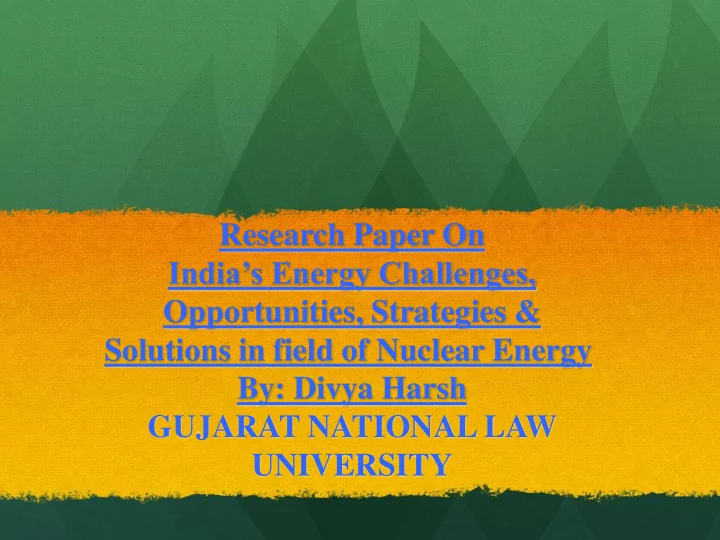

Research Paper On India’s Energy Challenges, Opportunities, Strategies & Solutions in field of Nuclear Energy By: Divya Harsh GUJARAT NATIONAL LAW UNIVERSITY
Challenges and Opportunities The study revolves around the existing national and international frameworks, regulations and norms and make recommendations to strengthen the former and it covers the following areas: (a) the prospects for nuclear energy development in India and the possible trajectory India's civilian nuclear energy programme (b) a survey of the best international practices relating to safety, security, liability management and ENR transfer operations and suitable recommendations there for the existing legal and institutional structures in India and the need to build a nuclear regime in the country that would be more responsive and accountable to the concerns and needs of the public and (c) the need for Indian government to enact a nuclear liability act to make it a partner in the international nuclear regime. (d)recommendations.
Energy Security International Support Factors that works as a catalyst for nuclear industry Yucca Mountain issue U.S. Civilian Nuclear Agreement Indo-US nuclear deal
Three-Stage Nuclear Programme Stages in Nuclear Energy Program 1. Stage -1 :Construction of Natural Uranium, Heavy Water Moderated & cooled Pressured Heavy Water Reactors (PWHRs). Spent fuel from these reactors is reprocessed to Plutonium. 2. Stage-2: Construction of Fast Breeder Reactors fuelled by Plutonium produced in Stage-1. Breed U-233 from Thorium. 3. Stage-3: Would Compromise power reactors using U-233 or Thorium as fuel.
Nuclear Power Plant
Major Critiques in Nuclear Energy Use of coal and fossil fuels Research &Development (R&D) Indo-U.S. Civilian Nuclear Agreement
ISSUES Rules and Regulations guiding reactors The International Atomic Energy Agency enumerates 11 basic principles for running and ionizing radiation activities.
Existing Legal Framework Atomic Energy Act,1962 Radiation Protection Rules Rule relating to the control of irradiation of Food Rules relating to Safe Disposal of Radiation Waves Other rules and Notifications Electricity Act,2003 Environment (Protection) Act,1986
Concluding The Legal Framework The following broad conclusions could be drawn from the survey of the existing regulatory framework relating to atomic energy: There are no provisions that relate to transparency or liability that arise out of any accident. There is some provision for compensation for certain matters relating to mining and other related areas. The 1962 Act does not have any reference to nuclear commerce or to any other purpose for which it might want to use nuclear energy. As the Preamble puts it, the essential objective of the 1962 Act is to “use atomic energy for the welfare of the people of India and for other peaceful purposes”. In this regard, if one could make a reference to the 1954 US Atomic Energy Act, it is comprehensive and addresses an entire range of issues. The Indian legal framework, in this sense, looks sketchy and details have been left out, perhaps deliberately, to be outlined in greater detail in rules and regulations .
Contd. There have been a number of rules and regulations that have been framed to carry out the essential objectives of the 1962 Act. In fact, it is incumbent on the Central Government to give effect and implement the provisions of the 1962 Act. The enactment also seeks to exclude the jurisdictions of the courts and other bodies on issues that come within the purview of the 1962 Act if done in good faith. That reflects perhaps the necessity to facilitate the unhindered growth of the nuclear regime and the attendant industry. At this juncture, some of these exclusionary clauses need a re- look so as to make the emerging nuclear regime in India more responsive and accountable to the needs of public at large.
Recommend
More recommend